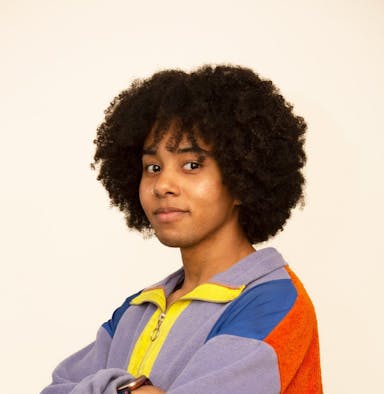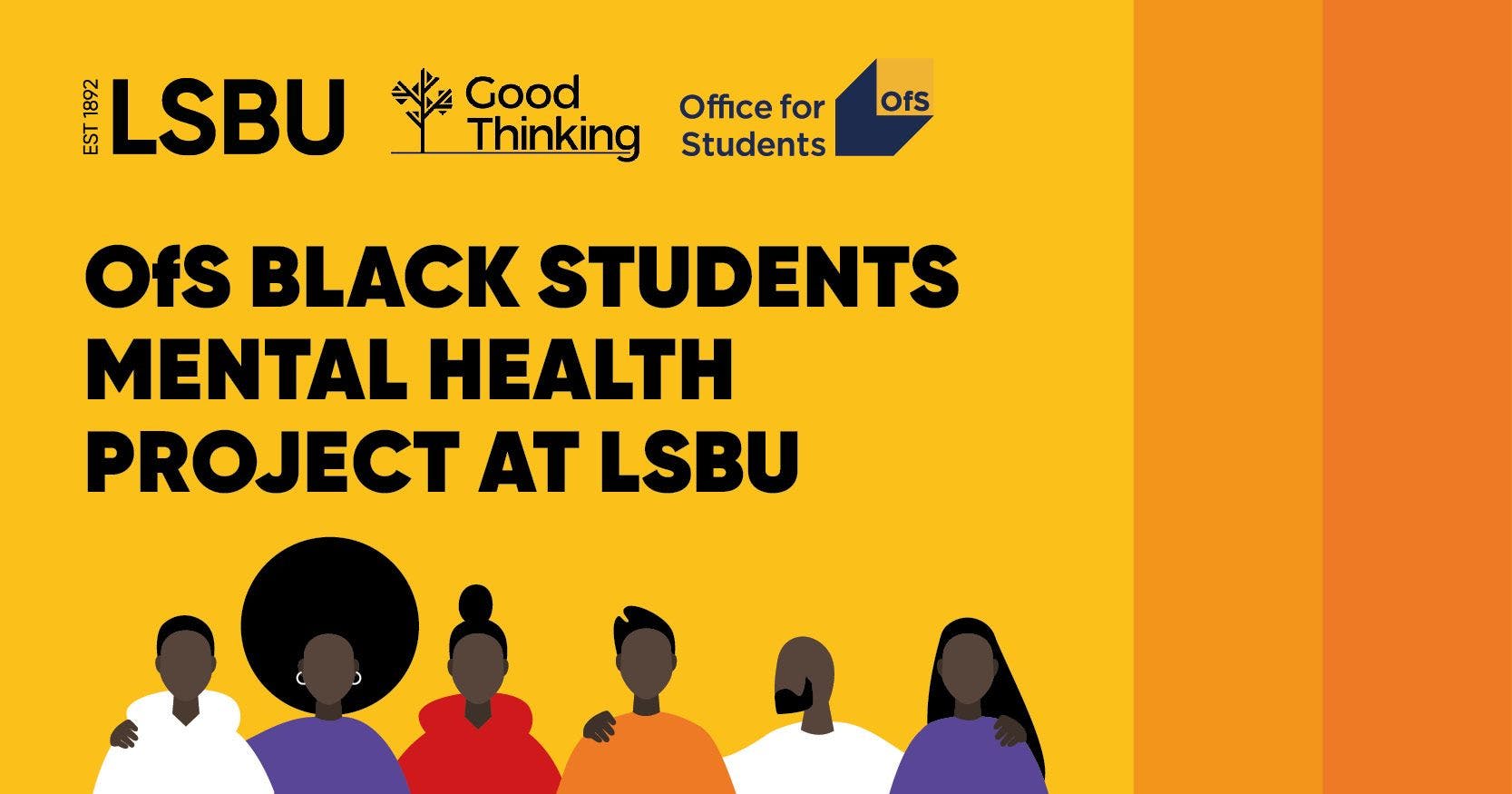An important message from Good Thinking
We regret to inform you that the Good Thinking service will be closing on 31 January 2026. This has been a difficult decision after eight years of supporting Londoners.
If you’re struggling with your mental health, please visit Every Mind Matters or Hub of Hope, or contact your GP, NHS 111, or the mental health team in your borough. For more information about the closure, read our FAQs.We have created an archive of the Good Thinking website for healthcare professionals.Approved by
LAST REVIEWED 20 March 2025
Looking after your wellbeing as a Black Queer student in London
A guest blog by the Black Students Mental Health Project at London South Bank University (LSBU). In this blog, third year student Michael shares his experience of starting university as a Black Queer student and some of the ways he looks after his mental health and wellbeing.
My name is Michael and I am a third year psychology student at London South Bank University. While writing this blog, I’m also in the process of finishing up my final pieces of coursework for my degree! The lovely people at Good Thinking have invited me to write about my experience of beginning university in London three years ago as an 18-year-old Black Queer student.
Settling into university life and meeting new people
Starting university was really nerve-wracking at first, particularly because I am also autistic. It’s an unfamiliar environment and I wasn’t doing the same courses as my friends from sixth form. I chose to stay in university accommodation so I let the accommodation know that I was trans and kept in very good communication with their wellbeing facilities. This was to ensure I’d be one of the lucky ones who got an en suite room as I find shared facilities quite daunting and am more comfortable with my own spaces. I wanted to be stealth for a bit so I could focus on my studies rather than being preoccupied with any outcomes or reactions that I found worrisome!
One of the first things I did when I moved in was leave a note introducing myself on the door. When I met my flatmates, I was quickly identified as “the one with the note on the door” – everyone found me really approachable after that. I struggle with small talk and can sometimes feel anxious when meeting new people so this took the edge off introducing myself.
I found transitioning from school to university classes particularly difficult because we were still learning remotely and social distancing due to COVID and it remained this way until my second year. This also made it difficult to meet new people and see old friends. Although my childhood friend, Alfred, went to LSBU as well, I could still feel isolated. He stayed in a different accommodation and was on a different course so we couldn’t really relate to each other’s specific experiences.
Starting university can cause a lot of your existing friendship circles to shift, especially if your friends have also gone to university. Hanging out when you’ve got to manage a new workload will look a lot different from what you are used to. I didn’t get to see my old circle of academically-ambitious friends as often after they scattered themselves across the UK. All of a sudden, the community I had been so well supported by felt harder to reach and I worried that I would struggle to find people I could so closely identify with on campus. This ended up not being that much of an issue – after COVID, we were all quite accustomed to video calls and digital hangouts. When meet ups became few and far between, I was always reassured by the fact that my loved ones were but a phone call away.
Finding your community
It’s important to feel like you belong in your immediate environment – on your course, in your accommodation and in societies and clubs that you may join. This can be difficult when you’re both Black and Queer. I found that some Black spaces were not always the most queer-inclusive and that Queer spaces were considerably less diverse than I would have hoped.
This shouldn’t make you want to close yourself off though! Even if few and far between, I did find a few diamonds in the rough who helped me through my degree.
Before moving in, I researched all the clubs, activities and societies available for Black and/or Queer students, both on and off campus. Echoing other blog posts you may have read on the Good Thinking website, connecting with other Black LGBT+ students was really validating for me, especially because I wasn’t very vocal about my trans identity outside of these friendships until I started my third year (most of my university friends will likely only find out once they see this blog post!).
I participated in plenty of projects focusing on enhancing the university experiences of Black and Queer students, providing insight on how to best maximise inclusivity so that the next generation of undergraduates will receive a warm welcome and plenty of adequate support. In fact, my participation in the Black Students Mental Health Project provided me with quite a few opportunities relevant to my degree and helped me feel like my input would have an impact on how certain decisions would be made.
Like many university gyms, mine was part of a scheme that provides the opportunity to attend the gyms at other participating universities across the country. This allowed me to go to the gym with my pre-university mates and we all know how instrumental both exercise and community are for your wellbeing!
As my university also had a campus in Croydon, I was lucky to become acquainted with Croydon Drop In, which is a counselling service that offers advice, advocacy and signposting to further support.
I also attended London Pride events, which are a marvellously massive display of pride in our identities, demonstrating the very large and intersectional community we have built in this city. Some universities march in the parade so it is always worth looking into.
Getting support from your university
I communicated with the wellbeing and disability staff and services at my university the second I confirmed my choices. This meant that they were well-prepared to provide me with my exact support arrangements for ADHD and ASD when I began my classes. I had pretty poor experiences regarding my identity in school so I wanted to make sure I would be well-supported if I had any negative experiences that could impact my studies.
Universities can often provide counselling, Specific Learning Difficulty (SpLD) assessments and signposting to other useful forms of support you might not be aware of, so it’s really good to be open and honest about anything you may be going through. Keeping in good communication will also help with any coursework extensions, disability accommodations or extenuating circumstances you may need throughout your degree.
Becoming part of London’s trans community
For any trans readers, I just want you to know that the London trans community is very tight-knit and communicative. We are all well aware of the negativity directed towards us in the media but you will be well looked after by all of us here! There will always be a friend, somewhere, and we are infamously known for how much we all know each other.
Groups such as Mermaids, Mosaic and Gendered Intelligence are good people to turn to and we have healthcare services, such as 56 Dean Street and TransPlus, who make experiences such as sexual health screenings and gender identity support very positive and stress-free.
Be sure to attend Trans Pride as well!
Useful resources for Black Queer students
Here is a list of organisations for Black Queer students recommended by students at LSBU:
- BLKOUT UK was created to recognise the need for Black Queer men to have a space to think, shout, show off, celebrate, launch, reflect, share and be heard. It encourages and stimulates debate and discussion online and face to face through its website, writer workshops, networking events and supporting interventions to meet the needs of Black Queer men.
- House of Rainbow fosters relationships among LGBTIQ+ people of colour, people of faith and allies to create a safer and a more inclusive community. With active groups in London and Africa, it is able to assist with issues and challenges such as reconciling sexuality and spirituality, asylum seekers’ support, sexual health, mental health and hate crimes.
- Purple Rain Collective is a collective for Queer, Trans and Intersex people of colour (QTIPOC) in the UK to mobilise, converse on their experiences and develop strategies for safety, resistance, and liberation. It creates a space where the QTIPOC community is choosing to come together and be there for one another in ways that prioritise their care, safety and wellbeing.
Useful Good Thinking resources
- Mental health and wellbeing support for students - check out Good Thinking’s range of advice and support to help you to stay mentally healthy at college and university
- Mental health and wellbeing support created by and for black students - explore the full range of blogs, podcasts and videos created by the LSBU Black Students Mental Health Project
- Stressed about exams? - advice to students on how to stay mentally well during exam season
- Five ways to good mental wellbeing - five steps you can take to help you to start to feel more positive and boost your wellbeing
- Looking out for those around you – a series of guides to help support friends and others in your community who may be struggling with their mental health
- Student Health App – a free app that enables you to instantly access reliable, relevant and reassuring health and wellbeing information
- International Student App – a free app for international students in the UK that contains information and tips to help you to settle into university life
- Other free NHS-approved apps - check out the full range of apps that Good Thinking recommend to help boost your mental wellbeing
This blog was written as part of the Office for Students' Black Students Mental Health Project at London South Bank University. Check out the full range of wellbeing resources available on the Good Thinking website.
Explore the resources >















